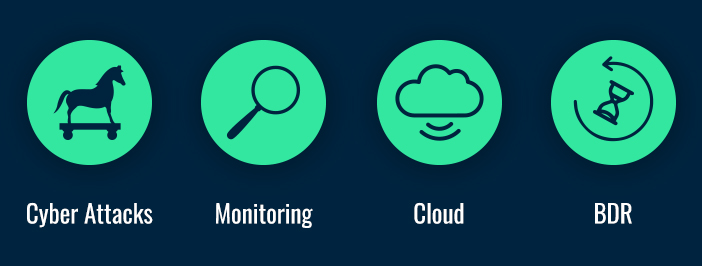4 Signs Your Business Needs Managed Services
Often you are so busy doing the daily activities that are most important in your business, that it’s easy to under-prioritize IT solutions. The good thing is that managed service providers have the focus and expertise to consult with you and find and anticipate any possible weak spots in your infrastructure and network. Together, you can prevent cyberattacks, monitor possible anomalies, save money, and be prepared for any worst-case-scenario.
If you can relate to any of these 4 warning signs, then it might be time to work with a managed services provider.
1. You don’t know how to prevent cyber attacks.
One of the primary benefits of working with a managed service provider (MSP) is the ability prevent and combat cyber attacks. Cyber attacks come in many forms, including viruses, ransomware, worms and more. The one thing they all have in common – besides everyone thinking it won’t happen to them – is a potentially disastrous effect on businesses.
The proliferation of cyber attacks on businesses is downright alarming. One recent study found that 75.6% of organizations encountered at least one successful cyber attack within the past 12 months. If your business is one of the 3 in 4 that is attacked, you risk suffering an extreme operational, reputational and even financial burden. A report by Data Center Dynamics concludes that cyber attacks cost the victims $40,000 per hour.
When you work with an MSP, you benefit from professionals experienced in and dedicated to preventing and combating cyber attacks on your infrastructure. Your MSP does this by creating a network protection plan with up-to-date security protocols, education for your employees, and monitoring for anomalies and intrusions.
As cyber attacks grow exponentially, creating and maintaining a dependable defense against network intrusions is paramount for staying a step ahead of the threats.
2. You don’t have around-the-clock monitoring.
When your managed services solution includes a help desk or network operations center (NOC), you’ll be able to eliminate downtime and keep your business running smoothly.
In ITIC’s latest survey, 98% of organizations say a single hour of downtime costs over $100,000. 81% of respondents indicated that 60 minutes of downtime costs their business over $300,000. And a record one-third of enterprises report that one hour of downtime costs their firms $1 million to over $5 million.
Good network health demands steadfast observation. Cyberattacks and network incidents don’t follow the same timetable as your business. When employees or customers encounter a problem in your network, it needs to be handled immediately or it could cost you significant losses.
This means you’ll need flexible, expert support.
If you use a network operating center (NOC), you will have dedicated professionals monitoring your network strength and performance. For instance, one sign of a computer worm is a massive network slowdown on as it consumes memory and resources.
At the NOC, your MSP will be able to filter out negative traffic and manage performance to allow the valid activity that keeps your business operating.
Your business could also benefit from a help desk. Whereas the NOC monitors and prevents network issues, the help desk can directly assist employees and clients with all of their technical and network needs.
3. You’ve yet to fully embrace the cloud.
Cloud services have made a phenomenal impact on businesses in every industry. With reports revealing that 90% of organizations use the cloud in some way and 50% use cloud services as their preferred solution, the chances are that you already use the cloud somehow in your office.
A qualified managed services provider will create a cloud solution for your business that saves you money and streamlines your workflow and processes. Moving to the cloud is beneficial for any company wanting to improve efficiency, flexibility or collaboration.
First of all, cloud services make scalability easier than ever. If you need to set up a new employee to the company, you just add another user to your current roster and extend permissions to the right resources. There’s no installation or licensing to plan for and they can work from any device in the office or on the road with their network credentials.
Another benefit of cloud services is the money saved on hardware. When you rely on a cloud server, you save money on physical components.
Additionally, if your MSP includes a cloud solution, you cut down internal payroll expenses by minimizing the cost of an in-house IT team. Forbes reported in one case study that cloud solutions provide a 37% savings over 3 years when compared to a self-managed, on-premises solution.
4. You have no solid backup and/or disaster recovery plan.
Data backup is an essential, yet often overlooked facet of a healthy infrastructure. Nationwide reports that 75% of businesses have no disaster recovery plan. Whether your data loss occurs due to a cyber attack or a natural disaster, you want to be up and running ASAP.
Managed service providers are experts at providing backup and disaster recovery solutions for your business. The goal is always business continuity. If you’re closed for business, you will experience financial and reputational losses.
One study shows that 54% of companies report experiencing downtime from a single event, lasting more than 8 hours.
A proper disaster recovery and data backup solution will help you avoid downtime at your business, and keep records safe so you can continue doing business.
We’re here to help.
Here at RWA, we are dedicated to helping you make your business the best it can be. We have experience working with our clients to design and implement technology solutions that achieve their goals and strengthen their operations.
Please give us a call or send us a message to find out more about managed services for your specific needs.














